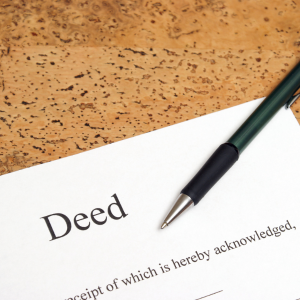
What is a Quit Claim Deed in Alabama?

A quit claim deed in Alabama is a paper used to transfer property ownership. The grantor often uses it to quickly transfer their interest in a property to someone else called the grantee. The grantor isn’t promising there are no problems with the title. People often use this type of deed when family members change who owns property or during a divorce.
Who Typically Uses Quitclaim Deeds?
Individuals use quitclaim deeds to make property transfers easy and fast. Family members might use it to pass ownership to each other. One can use it to remove their name from the property during a divorce. The grantor gives up their claim in these deals, and the grantee receives it.
Legal Requirements for Filing a Quit Claim Deed in Alabama

What Must be Included in the Document?
For a quit claim deed in Alabama to be legal, it must include the following:
- The names of the grantor and grantee
- A clear legal description of the property
- The grantor’s signature, which needs notarization
- Submission to the county recorder
These parts make the deed valid for transferring property.
Where to File a Quitclaim Deed?
After completing the required details, file the quitclaim deed at the county recorder’s office in Alabama. Filing it keeps a record in local files, helping track who owns the property. Each county’s deeds office is in charge of recording and maintaining these records. Filing with the local authority confirms the property transfer and protects the interests of both parties involved.
How to Complete a Quit Claim Deed Form

A quitclaim deed form is a legal document that lets you transfer property rights from one person to another. It is essential to correctly fill out this form to ensure the transfer is valid in Alabama. Here’s how to complete a quitclaim deed form in Alabama.
Steps to Fill Out the Form Properly
- Get the Right Form: Ensure you have the correct Alabama property deed form.
- List the Parties: Write down the names of the grantor (the person giving up ownership) and the grantee (the person receiving ownership).
- Describe the Property: Use details from earlier legal documents to describe the transferred property.
- Follow Instructions: Read the instructions carefully with the quitclaim deed form.
- Check Details: Review all the information to ensure everything is correct before signing.
Common Mistakes to Avoid
- Leaving Sections Blank: Fill in every form section; don’t leave any part empty.
- Mistakes in Information: Double-check the names and details of the property to prevent errors.
- Wrong Filing: Submit the form to the appropriate county office in Alabama, where the property is located.
Who Needs to Sign and Notarize the Quitclaim Deed?

Both the grantor and the grantee need to sign the quitclaim deed. In Alabama, you must notarize the document to make it legally valid.
Role of the Grantor and Grantee
- Grantor: The person who fills out the deed and transfers property rights.
- Grantee: The person who gets the property rights and should check all details before signing.
Why is Notarization Necessary?
In Alabama, you must notarize a quitclaim deed. It verifies the signatures, providing legal validation for the property transaction. This process helps prevent fraud and makes sure the document is accurate.
For more information on Alabama property transactions, reach out to River Region Home Buyers. We can guide you through the details of real estate paperwork.
Filing Process: Step-by-Step Guide
Submitting the Quitclaim Deed Form
![how to fill out quitclaim deed in market_city]](https://image-cdn.carrot.com/uploads/sites/56936/2024/12/how-to-fill-out-quitclaim-deed.png)
Complete the form correctly when you’re ready to submit your quitclaim deed in Alabama. This legal document must include details about the property and the people involved. After completing the quitclaim deed, file it at the county recorder’s office where the property is situated. This step records the property transfer in public records. In Alabama, this recording process is essential for showing the change in ownership.
How Long Does the Processing Take?
The processing time for a quitclaim deed can vary. Usually, it depends on how busy the county recorder’s office is. Expect Alabama’s title transfer and recording process to take a few weeks. The quitclaim deed filing fee is essential since it’s needed to update property records. Fill out all real estate forms correctly to avoid delays.
What are the Costs Involved in Filing a Quit Claim Deed in Alabama?
Typical Fees You Should Expect

Filing a quitclaim deed in Alabama comes with several costs. The main expenses include the quitclaim deed cost and the filing fee. You might also want to hire a real estate attorney for help with any legal requirements for a quitclaim in Alabama, which can be an extra cost. Recording fees are another ordinary expense when transferring a deed.
Are There Additional Costs?
Besides the typical fees, there might be other costs when filing a quitclaim deed. For instance, doing a property deed search in Alabama may cost money, and lawyer fees can add up if you need legal advice or help. Notarization requirements in Alabama mean you might need to pay for this service so your documents are legally recognized. Also, a property title search can be part of estate planning to ensure all details are correct and up-to-date.
Potential Legal Implications of a Quitclaim Deed

A quitclaim deed is a legal document used to transfer property in Alabama. Understanding how this deed can affect things like mortgages, liens, and divorce settlements is essential. Knowing these implications helps manage property ownership and ensure proper legal documentation in Alabama.
Does it Affect Mortgage or Liens?
When property ownership changes in Alabama using a quitclaim deed, you must consider current mortgages and liens. A quitclaim deed does not assure the property is free from liens or debts. These details can make real estate forms in Alabama tricky. According to Alabama property law, the original owner usually remains responsible for any mortgage unless specified otherwise. Talking to a real estate attorney to fully understand the effects is wise.
Can It Be Used in Divorce Settlements?
Quitclaim deeds are often used in divorce settlements to transfer marital property between partners. There are specific rules for using a quitclaim deed for property transfer in Alabama. The process can make dividing property easier, but everyone involved needs to clearly understand the legal steps to comply with Alabama’s requirements.
Differences Between Quitclaim and Warranty Deeds

Choosing between a quitclaim and a warranty deed in Alabama requires knowing their key differences. A quitclaim deed does not offer legal protections about the property’s title. On the other hand, a warranty deed assures the title, offering better security against future problems during a title transfer in Alabama.
Which Situations Call for Each Type?
- Quitclaim Deed Uses: These are commonly used when transferring property between family members, in divorce settlements, or fixing title errors. They work well when there is trust between parties.
- Warranty Deed Uses: These are better when buying property from someone unknown or seeking legal protection. Doing a property title search in Alabama before getting a warranty deed is smart to ensure clear ownership and prevent disputes.
Legal Protections and Guarantees Provided
Warranty deeds provide strong legal protections and title guarantees that quitclaim deeds do not. Working with real estate in Alabama, involving a real estate attorney, is helpful to ensure correct title transfer and recording of deeds. Correctly filing the forms adds protection against potential legal issues and confirms your property’s title is legitimate. Getting professional advice helps you understand the legal protections of each type of deed.
Where to Get Legal Advice on Quitclaim Deeds?

Talk to an Alabama real estate attorney if you need help with quitclaim deeds. They know much about local property laws and can give you good advice. Real estate law is tricky. Having expert help makes sure you make wise choices.
Consulting with an Alabama Real Estate Attorney
You should speak with a real estate attorney to handle legal papers for property in Alabama. They have the skills to prepare and file the documents correctly. A reasonable attorney helps you understand property law and gives you help every step of the way.
When Might You Need Professional Assistance?
Sometimes you might need help with quitclaim deeds:
- Property Title Changes: If you’re changing who owns a property, an attorney in Alabama can make sure it’s done right.
- Dispute Resolution: If there is a disagreement, legal experts can find solutions using Alabama property law.
- Complex Transactions: For tricky property deals, having an attorney keeps everything legal and clear.
How to Resolve Disputes Arising from Quitclaim Deeds?
Problems with quitclaim deeds can happen, but you can solve them. Here’s how you can fix disputes:
- Mediation: This is a peaceful way to solve problems without going to court.
- Legal Action: If mediation fails, you might have to take legal action. An Alabama real estate attorney can guide you.
- Addressing Property Title Issues: Sometimes issues come up because of unclear title details. Getting professional help can make things clear and avoid future troubles.
Options for Mediation or Legal Action
If you face property disputes, here are your choices:
- Mediation: This is a cheaper way to settle disagreements and keep things friendly.
- Legal Action: This involves formal steps in Alabama’s courts. It’s smart to have a real estate attorney help you through this complex process.
Ensuring Proper Documentation and Record Keeping
Keeping good records is very important in Alabama real estate deals. Here’s how to do it right:
- Maintain Accurate Property Records: Keep all documents about property records in Alabama safe.
- Deed Preparation: Make sure quitclaim deeds are prepared correctly to prevent future issues.
- Title Transfer: Document the title transfer carefully to secure property rights and avoid legal problems.
By following these steps, you can manage quitclaim deeds well and reduce legal risks. Remember, River Region Home Buyers is here to help with your real estate needs in Alabama.
FAQs:
How can I file a quitclaim deed in Alabama?
First, to file a quitclaim deed in Alabama, get the Alabama quitclaim deed form. Fill it out with all the needed information. Then, have it signed by a notary public. Finally, take it to the county recorder’s office where the property stands.
What is the difference between a quitclaim deed and a warranty deed in Alabama?
A quitclaim deed gives whatever ownership rights the person has without making any promises. A warranty deed, however, assures that the title of other claims is clear.
Where do I file Alabama deed forms?
You need to file Alabama deed forms at the county recorder’s office in the county where the property stands. Filing the deed makes the transfer official.
How do I get help with preparing real estate deeds in Alabama?
For help with preparing real estate deeds in Alabama, you can talk to a real estate attorney. They can advise and ensure the deed meets all legal requirements.
What is required to notarize a quitclaim deed in Alabama?
You need to sign the quitclaim deed in front of a notary public. The notary will check your identity and watch you sign the document to make it legal.
Can I download an Alabama quitclaim deed template online?
Yes, you can find downloadable Alabama quitclaim deed templates online. Make sure the form follows Alabama state laws.
What fees are involved when filing a quitclaim deed in Alabama?
The fee for filing a quitclaim deed varies from county to county. Check the exact amount with the local county recorder’s office in Alabama.
What role does the Alabama probate court play in property transfers?
The Alabama Probate Court helps with property transfers if you need an executor deed. This situation usually arises when someone has passed away, and their property needs to change ownership.
Key Insights
- To file a quitclaim deed in Alabama, understand the needed Alabama deed forms and their rules.
- An Alabama quit claim deed lets you transfer property. Make sure you do all the needed deed preparation in Alabama.
- When filing real estate papers like a quitclaim deed, know the steps and any quitclaim deed filing fees.
- Do a complete property title search in Alabama to check who owns the property before making any property ownership change.
- Knowing when to use quitclaim deeds in Alabama is important, like giving property to family or changing joint owners.
- Get the quitclaim form for Alabama from official state sources to make sure it’s correct and legal.
- If you’re an executor managing an estate, you might need an executor deed in Alabama for property during probate.
- Get legal advice on quitclaim deeds to solve any worries about mistakes or disputes from wrong filings.
- A property deed search in Alabama helps find past deals that might affect you if you’re buying or transferring property.
- Doing an Alabama title search makes sure no liens or problems are with the property, protecting your investment.
If you want to sell your property to a cash buyer, contact us at River Region Home Buyers. We buy houses all around Alabama. Contact us at (334) 554-3296 or by filling out our short form below. These findings apply to all cities in Alabama, including Montgomery, Alabaster, Bessemer, Birmingham, Tuscaloosa, Huntsville, and more! Do you have any questions? No problem! We can help you with any real estate needs you may have!
"*" indicates required fields
Additional Resources For Alabama Sellers


